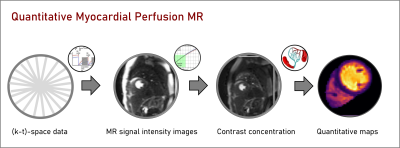Weekday Course
The Chest Pain Chess Game
ISMRM & ISMRT Annual Meeting & Exhibition • 03-08 June 2023 • Toronto, ON, Canada

| Ischemic Cardiomyopathies | |||
| 08:15 |
Coronary in the Coal Mine: Perfusion-Related Chest Pain
Andreas Schuster
Keywords: Cardiovascular: Myocardium, Contrast mechanisms: Perfusion While acute coronary syndrome (ACS) continues to be subject of invasive coronary angiography the diagnosis and management of chronic coronary syndrome (CCS) largely depends on non-invasive imaging of myocardial ischaemia and viability. Since cardiovascular MRI has repeatedly demonstrated high accuracy for the diagnosis and prognostication of CCS it has received a class I guideline recommendation (highest level). It should therefore be preferred over invasive angiography for CCS. This presentation will touch on the underlying physiology of myocardial ischaemia, address basic measurement principles including novel strategies and discuss them in the context of current guidelines with an emphasis on prognostic implications. |
||
| 08:45 |
 |
MR Techniques for Quantifying Myocardial Perfusion
Teresa Correia
Keywords: Contrast mechanisms: Perfusion, Cardiovascular: Cardiac, Image acquisition: Quantification Myocardial perfusion imaging is an essential tool for characterising ischemic heart disease. Moreover, quantitative myocardial perfusion methods that provide pixel-wise quantitative myocardial perfusion maps are increasingly being applied as an alternative to visual inspection. Newer methods combine quantitative imaging with acceleration techniques and motion compensation to overcome current limitations of the technique, and thus, improve spatial resolution and heart coverage, reduce image degradation due to motion and accurately detect perfusion defects. In addition, fully automated workflows are facilitating the integration of quantitative myocardial perfusion into clinical practice by making it faster and easier to use. |
|
| Non-Ischemic Cardiomyopathies | |||
| 09:15 |
Achy Braky Heart: Non-Coronary Cause of Chest Pain
Bettina Baeßler
Keywords: Cardiovascular: Cardiac, Cardiovascular: Myocardium, Cardiovascular: Valves Chest pain can have many different causes. Besides acute and stable coronary syndromes, a variety of differentials exist when it comes to non-coronary cardiac chest pain. MRI can provide detailed images of the heart and surrounding structures, allowing for the identification of abnormalities that may contribute to chest pain. By utilizing advanced imaging techniques, MRI can detect inflammation, valve disease, and other potential causes of chest pain. The presentation will emphasize the value of MRI as a non-invasive and comprehensive tool in assessing patients with cardiac chest pain, potentially reducing the need for invasive procedures and improving patient outcomes. |
||
| 09:45 |
MR Methods for Myocardial Parameter Mapping
Chiara Coletti
Keywords: Cardiovascular: Cardiac, Contrast mechanisms: Relaxometry, Image acquisition: Quantification Myocardial parametric mapping has expanded the diagnostic potential of CMR for a wide range of cardiovascular diseases. While conventional tissue characterization techniques rely on relative variations in signal intensity to detect abnormalities, parametric mapping provides pixel-wise quantification of relaxation times on absolute scales. This enables the characterization of non-focal cardiomyopathies, as well as intra/inter-subject analysis. T1, T2 and ECV mapping sequences are routinely used in clinical protocols, and new biomarkers are emerging to avoid using contrast agents. Solving challenges like long scan time, susceptibility to artifacts and lack of standardization is essential to promote their application in clinical practice. |
||
The International Society for Magnetic Resonance in Medicine is accredited by the Accreditation Council for Continuing Medical Education to provide continuing medical education for physicians.